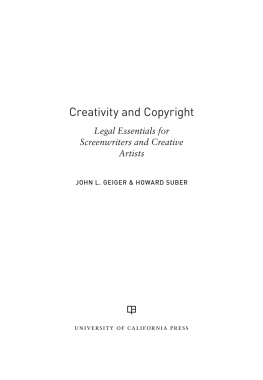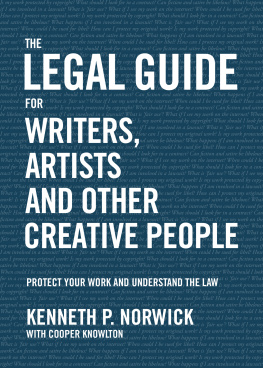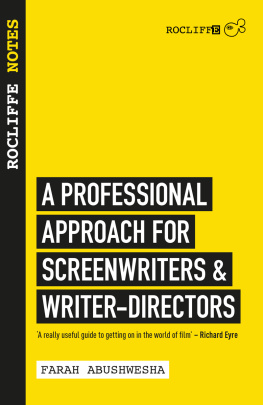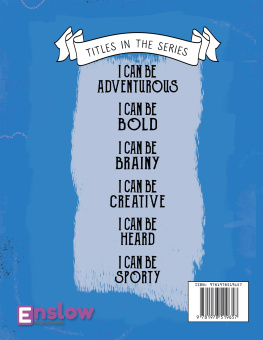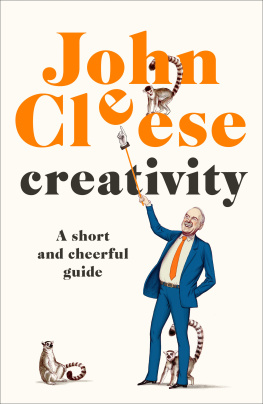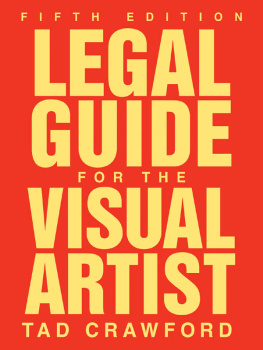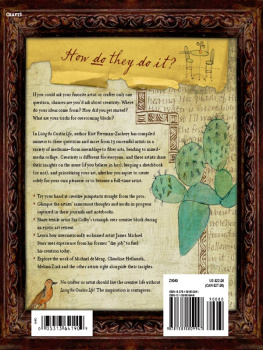PRAISE FOR CREATIVITY AND COPYRIGHT
A must-read for those who create original work and want to understand the line between copyrighted material and what they create.
Mike Medavoy, film producer and former studio head, whose filmography ranges from Rocky to Black Swan
Creativity and Copyright is the grail you will never find in film school. Although written with the writer in mind, I would easily argue its also a must-know for filmmakers, producers, managersa no-regrets resource that finally reveals the creative power to be unleashed by your own legal muscle.
Demetra J. MacBride, producer of Mystery Train, Night on Earth, When Pigs Fly, Coffee and Cigarettes , and Dead Man
A handy, user-friendly book for screenwriters who are looking for immediate, precise answers to their most pressing questions.
Denise Mann, head of the UCLA School of Theater, Film and Televisions Producers Program
All aspiring and working screenwriters should keep this book next to their computers.
Daniel Bernardi, author of Off the Page: Screenwriting in the Era of Media Convergence
Somehow Geiger and Suber make crystal clear a topic every writer struggles to understand. Put it on your bookshelf next to the dictionary and thesaurus; it could save you from heartbreak, broken friendships, and financial ruin. Oh, and its also a great read.
Daniel Pyne, showrunner, screenwriter, and author
Howard Suber is perhaps the most knowledgeable person on the planet when it comes to the intersection of creativity and commerce in the film business. For more than four decades, students have entered his classroom to see the secrets of screen magic revealednot only how movies work, but why they affect us so deeply, and how we can apply those secrets to our own work. In this book he and attorney-screenwriter John Geiger have provided the most comprehensive and accessible guide to the legal realities and avoidable missteps in the businessas well as how not to get ripped off!
Writer-director Robin Russin, coauthor of Screenplay: Writing the Picture
I cant imagine anyone else approaching this material more capably or in such a reader-friendly manner.
Tom Nunan, producer of Crash and The Illusionist
Creativity and Copyright
Creativity and Copyright
Legal Essentials for Screenwriters and Creative Artists
JOHN L. GEIGER & HOWARD SUBER

UNIVERSITY OF CALIFORNIA PRESS
University of California Press, one of the most distinguished university presses in the United States, enriches lives around the world by advancing scholarship in the humanities, social sciences, and natural sciences. Its activities are supported by the UC Press Foundation and by philanthropic contributions from individuals and institutions. For more information, visit www.ucpress.edu.
University of California Press
Oakland, California
2019 by John L. Geiger and Howard Suber
Library of Congress Cataloging-in-Publication Data
Names: Geiger, John L., 1959 author. | Suber, Howard, 1937 author.
Title: Creativity and copyright : legal essentials for screenwriters and creative artists / John L. Geiger and Howard Suber.
Description: Oakland, California : University of California Press, 2019 | Includes bibliographical references and index. |
Identifiers: LCCN 2018048202 (print) | LCCN 2018051057 (ebook) | ISBN 9780520972742 (Epub) | ISBN 9780520303522 (cloth : alk. paper) | ISBN 9780520303539 (pbk. : alk. paper)
Subjects: LCSH : CopyrightUnited States.
Classification: LCC KF 2994 (ebook) | LCC KF 2994 . G 45 2019 (print) | DDC 346.7304/82dc23
LC record available at https://lccn.loc.gov/2018048202
28 27 26 25 24 23 22 21 20 19
10 9 8 7 6 5 4 3 2 1
To Ana Sufuentes & Luca Marc Geiger, my family eternal
John
To the screenwriting, directing and producing students I have known during more than half a century of teaching film and television at UCLA
Howard
Contents
Acknowledgments
Creativity and Copyright found its way into print because of Steven Jenkins, development director of the University of California Press Foundation. Were this a movie, hed be our executive producer.
We are grateful for the generous help and tireless efforts of the University of California Press teamacquisitions editor Raina Polivka, and her editorial assistants Elena Bellaart and Madison Wetzell; senior editor Emilia Thiuri; developmental editor Ann Donahue; and copy editor Jan Spauschusin preparing this manuscript for publication and getting us to the final cut.
Before guidance from the UC Press team, the project benefited from manuscript review and publishing advice from our friends and colleagues Nathan Cole, Suzanne Curtis, Ken Lee, Cortez Smith, and Michael Wiese.
Book aesthetics have always been important to us. Our special thanks to friend and colleague Charles Bigelow for his erudite eye in advising on the look of the book.
This project benefited greatly from the kind and careful attention of each of these participants. Any errors or omissions are uniquely ours. And between the two of us, we blame the other guy.
Disclaimer
This book is designed to provide accurate and authoritative information regarding its subject matter, is based upon sources believed to be accurate and reliable, is intended to be current as of the time written, and is sold with the understanding that neither the publisher nor the authors are engaged in rendering legal or other professional services to the readers. If legal or other professional advice is required, readers should engage the appropriate advisor for their particular needs.
Introduction
For most of Western history, there was no copyright or other such intellectual property protection for artists, because there was no need for it.
If you were a painter, writer, dramatist, or other artist during the Renaissance, you were not part of an open market. Instead, you had a patron, who paid you once for a work that couldnt be reproduced. Then as now, making a living as an artist was hard. Even if you were lucky or talented enough to attract a patron, you received no further compensation, at least not for that particular work. If that seems like a bad deal, keep in mind that your patron had no expectation of receiving a payoff, or revenue stream, for his money. Your patron was a buyer, not an investor. He hadnt commissioned your work for commercial purposes. He couldnt have prints or calendars made to sell at the gallery gift shop.
Copyright became necessary for the first time in the age of mechanical reproduction. Mechanical reproduction of a work changed that work from being merely a possession to being an investment. The patron who commissioned your work and paid for it now often did so with the hope of making a profit by reproducing the work for a broader audience.
We have written Creativity and Copyright to serve as a guidebook for screenwriters and others looking to increase their likelihood of success as professional writers. Our overriding purpose is to increase your understanding of the relationships among business goals, legal issues, and creative freedom. In our experience, a balanced approach is most likely to result in a long-term career.
As a screenwriter, you will usually focus on your writing. Writing is obviously controlled by creativity . At other times, you will be selling. Selling is controlled by copyright . Hence, Creativity and Copyright.

